CAIRO: The Muslim holy month of Ramadan — when the faithful fast from dawn to dusk — began at sunrise Saturday in much of the Middle East, where Russia’s invasion of Ukraine has sent energy and food prices soaring.
The conflict cast a pall over Ramadan, when large gatherings over meals and family celebrations are a tradition. Many in the Southeast Asian nation of Indonesia planned to start observing Sunday, and some Shiites in Lebanon, Iran and Iraq were also marking the start of Ramadan a day later.
Muslims follow a lunar calendar and a moon-sighting methodology can lead to different countries declaring the start of Ramadan a day or two apart.
Muslim-majority nations including Saudi Arabia, Egypt, Syria, Sudan and the United Arab Emirates had declared the month would begin Saturday morning.
A Saudi statement Friday was broadcast on the kingdom’s state-run Saudi TV and Sheikh Mohammed bin Zayed Al Nahyan, the crown prince of Abu Dhabi and de facto leader of the United Arab Emirates, congratulated Muslims on Ramadan’s arrival.
Jordan, a predominantly Sunni country, also said the first day of Ramadan would be on Sunday, in a break from following Saudi Arabia. The kingdom said the Islamic religious authority was unable to spot the crescent moon indicating the beginning of the month.
Indonesia’s second-largest Islamic group, Muhammadiyah, which counts more than 60 million members, said that according to its astronomical calculations Ramadan begins Saturday. But the country’s religious affairs minister had announced Friday that Ramadan would start on Sunday, after Islamic astronomers in the country failed to sight the new moon.
It wasn’t the first time the Muhammadiyah has offered a differing opinion on the matter, but most Indonesians — Muslims comprise nearly 90 percent of the country’s 270 million people — are expected to follow the government’s official date.
Many had hoped for a more cheerful Ramadan after the coronavirus pandemic blocked the world’s 2 billion Muslims from many rituals the past two years.
With Russia’s invasion of Ukraine, however, millions of people in the Middle East are now wondering where their next meals will come from. The skyrocketing prices are affecting people whose lives were already upended by conflict, displacement and poverty from Lebanon, Iraq and Syria to Sudan and Yemen.
Ukraine and Russia account for a third of global wheat and barley exports, which Middle East countries rely on to feed millions of people who subsist on subsidized bread and bargain noodles. They are also top exporters of other grains and sunflower seed oil used for cooking.
Egypt, the world’s largest wheat importer, has received most of its wheat from Russia and Ukraine in recent years. Its currency has now also taken a dive, adding to other pressures driving up prices.
Shoppers in the capital Cairo turned out earlier this week to stock up on groceries and festive decorations, but many had to buy less than last year because of the soaring prices.
Ramadan tradition calls for colorful lanterns and lights strung throughout Cairo’s narrow alleys and around mosques. Some people with the means to do so set up tables on the streets to dish up free post-fast Iftar meals for the poor. The practice is known in the Islamic world as “Tables of the Compassionate.”
“This could help in this situation,” said Rabei Hassan, the muezzin of a mosque in Giza as he bought vegetables and other food from a nearby market. “People are tired of the prices.”
Worshippers attended mosque for hours of evening prayers, or “tarawih.” On Friday evening, thousands of people packed the Al-Azhar mosque after attendance was banned for the past two years to stem the pandemic.
“They were difficult (times) ... Ramadan without tarawih at the mosque is not Ramadan,” said Saeed Abdel-Rahman, a 64-year-old retired teacher as he entered Al-Azhar for prayers.
Soaring prices also exacerbated the woes of Lebanese already facing a major economic crisis. Over the past two years, the currency collapsed and the country’s middle class was plunged into poverty. The meltdown has also brought on severe shortages in electricity, fuel and medicine.
In the Gaza Strip, few people were shopping Friday in markets usually packed at this time of year. Merchants said Russia’s war on Ukraine has sent prices skyrocketing, alongside the usual challenges, putting a damper on the festive atmosphere that Ramadan usually creates.
The living conditions of the 2.3 million Palestinians in the impoverished coastal territory are tough, compounded by a crippling Israeli-Egyptian blockade since 2007.
Toward the end of Ramadan last year, a deadly 11-day war between Gaza’s Hamas rulers and Israel cast a cloud over festivities, including the Eid Al-Fitr holiday that follows the holy month. It was the fourth bruising war with Israel in just over a decade.
In Iraq, the start of Ramadan highlighted widespread frustration over a meteoric rise in food prices, exacerbated in the past month by the war in Ukraine.
Suhaila Assam, a 62-year-old retired teacher and women’s rights activist, said she and her retired husband are struggling to survive on their combined pension of $1,000 a month, with prices of cooking oil, flour and other essentials having more than doubled.
“We, as Iraqis, use cooking oil and flour a lot. Almost in every meal. So how can a family of five members survive?” she asked.
Akeel Sabah, 38, is a flour distributor in the Jamila wholesale market, which supplies all of Baghdad’s Rasafa district on the eastern side of the Tigris River with food. He said flour and almost all other foodstuffs are imported, which means distributors have to pay for them in dollars. A ton of flour used to cost $390. “Today I bought the ton for $625,” he said.
“The currency devaluation a year ago already led to an increase in prices, but with the ongoing (Ukraine) crisis, prices are skyrocketing. Distributors lost millions,” he said.
In Istanbul, Muslims held the first Ramadan prayers in 88 years in the Hagia Sophia, nearly two years after the iconic former cathedral was converted into a mosque.
Worshippers filled the 6th-century building and the square outside Friday night for tarawih prayers led by Ali Erbas, the government head of religious affairs. Although converted for Islamic use and renamed the Grand Hagia Sophia Mosque in July 2020, COVID-19 restrictions had limited worship at the site.
“After 88 years of separation, the Hagia Sophia Mosque has regained the tarawih prayer,” Erbas said, according to the state-run Anadolu Agency.
Ramadan kicks off in much of Middle East amid soaring prices
https://arab.news/2ux79
Ramadan kicks off in much of Middle East amid soaring prices
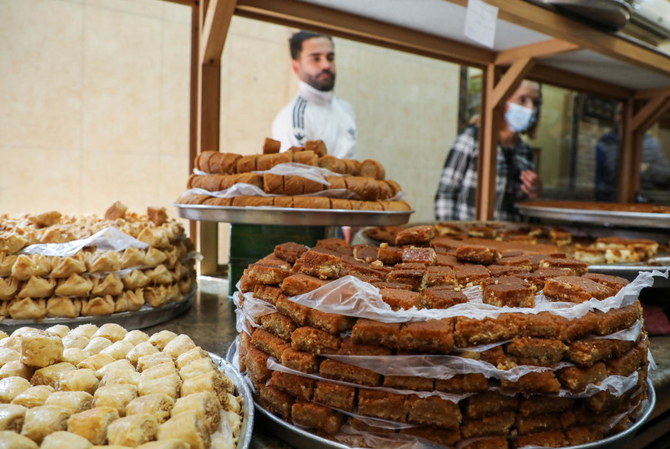
- The conflict cast a pall over Ramadan, when large gatherings over meals and family celebrations are a tradition
- With Russia’s invasion of Ukraine, however, millions of people in the Middle East are now wondering where their next meals will come from
Iran to send experts to ally Venezuela to help with medical accelerators

- “Venezuela has a number of accelerators in its hospitals that have been stopped due to the embargo,” the message said
CARACAS: Iran on Saturday said it will send experts to its ally Venezuela to help with medical accelerators in hospitals it said had been stopped due to Western sanctions.
Venezuela requested Iran’s help, according to a message on the social media platform X by the Iranian government attributed to the head of the Atomic Energy Organization of Iran.
“Venezuela has a number of accelerators in its hospitals that have been stopped due to the embargo,” the message said.
Medical accelerators are used in radiation treatments for cancer patients.
Venezuela is also an ally of Russia and China.
The return of US sanctions on Venezuela’s oil industry has made its alliance with Iran critical to keeping its lagging energy sector afloat. Washington last year temporarily relaxed sanctions on Venezuela’s promise to allow a competitive presidential election. The US now says only some conditions were met.
Three Syrians missing after cargo ship sinks off Romania

- Eight sailors were rescued by one of the nearby commercial vessels, while the search for the other three, “all of Syrian nationality,” was continuing, the statement said
BUCHAREST: Romanian rescue teams on Saturday were scouring the Black Sea for three Syrian sailors who went missing when their cargo ship sank off the coast, the naval authority said.
The Mohammed Z sank with 11 crew on board, 26 nautical miles off the Romanian town of Sfantu Gheorghe in the Danube delta in the Black Sea on Saturday morning, officials said in a statement.
The ship sailing under the Tanzanian flag was carrying nine Syrian and two Egyptian nationals, it said.
After receiving an alert at “around 4:00am,” naval authorities and border police were dispatched, with two nearby commercial vessels also joining the search and rescue operation.
Eight sailors were rescued by one of the nearby commercial vessels, while the search for the other three, “all of Syrian nationality,” was continuing, the statement said.
The cause of the accident was unclear.
According to the specialist website Marine Traffic, the ship departed from the Turkish port of Mersin and was heading to the Romanian port of Sulina.
Since the start of Russia’s war in Ukraine, drifting sea mines have posed a constant threat for ships in the Black Sea, with countries bordering it doubling down on demining efforts.
Ensuring safe passage through the Black Sea has gained particular importance since Romania’s Danube ports became hubs for the transit of grain following the Russian blockade of Ukraine’s ports.
Iraq parliament fails to elect a speaker

- A coalition of three Sunni blocs backed Issawi, while Mashhadani, who served as Iraq’s first speaker following the adoption of the 2005 constitution, received the support of the former speaker Mohamed Al-Halbussi’s sizeable bloc
BAGHDAD: Iraq’s lawmakers failed to elect a speaker on Saturday as neither of the two main candidates secured a majority during a tense session of parliament.
It is the latest in a series of failed attempts to replace the former head of parliament who was dismissed in November, with political bickering and divisions between key Sunni parties derailing every attempt so far.
Saturday’s vote was the closest yet to selecting a new head of the 329-member parliament, with 311 lawmakers showing up for the session and the leading candidate falling just seven votes short.
The parliament’s media office announced that 137 lawmakers chose Mahmoud Al-Mashhadani, the oldest MP, while 158 picked Salem Al-Issawi.
However, candidates require at least 165 votes to win.
Many lawmakers did not return for a second attempt on Saturday, with local media sharing videos of a brief brawl between MPs and reporting that at least one of them was injured.
The parliament’s media office then announced that the session had been adjourned.
Iraq, a mosaic of different ethnic and religious groups, is governed by complex power-sharing arrangements.
The largely ceremonial role of president traditionally goes to a Kurd, that of prime minister to a Shiite, while the speaker of parliament is usually Sunni.
But parliament is dominated by a coalition of pro-Iran Shiite parties, reflecting the country’s largest religious group.
A coalition of three Sunni blocs backed Issawi, while Mashhadani, who served as Iraq’s first speaker following the adoption of the 2005 constitution, received the support of the former speaker Mohamed Al-Halbussi’s sizeable bloc.
The new speaker will replace Halbussi, the influential politician dismissed by Iraq’s top court in November last year after a lawmaker accused him of forging a resignation letter.
Halbussi had been the country’s highest-ranking Sunni official since he first became a speaker in 2018.
The new speaker’s stint will not last long with the general election due in 2025.
Libyan armed groups clash near capital Tripoli

- Libya is divided between the UN-recognized Tripoli-based government and a rival administration in the country’s east
TRIPOLI: Clashes between Libyan armed groups broke out on Friday night in the city of Zawiya, some 40 kilometers west of the capital Tripoli, a security official told AFP.
An official at the city’s security directorate told AFP the clashes were ongoing but “intermittent” on Saturday.
“The southern areas of the city of Zawiya have been witnessing clashes between armed groups since last night,” the official said.
Libya is still struggling to recover from years of war and chaos after the 2011 overthrow of longtime dictator Muammar Qaddafi.
On Saturday morning, schools in Zawiya were suspended as some roads leading to the city were shut down amid a “casual” exchange of fire between the groups, the official said.
Media reports said the fighting left casualties, but authorities in Tripoli have yet to confirm any.
The Tripoli-based health ministry said in a statement it was working to evacuate parts of the city and taking injured people to hospitals.
The Libyan Red Crescent said it had evacuated some families from areas affected by the fights.
Authorities have not disclosed the reasons behind the fight.
Videos shared since Friday night on social media, which AFP could not verify, showed armed men in SUVs firing heavily at other armed groups.
Other videos showed smoke rising from parts of the city.
Although relative calm has returned to the oil-rich country in the past few years, clashes periodically occur between its myriad armed groups.
Last month, clashes broke out in the capital Tripoli, sparking panic among locals who were celebrating the end of the Muslim fasting month of Ramadan.
In August 2023, Tripoli’s worst armed clashes in a year left 55 people dead when two powerful groups fought.
Libya is divided between the UN-recognized Tripoli-based government and a rival administration in the country’s east.
How women and girls in war-torn Gaza are coping with water, sanitation and hygiene collapse

- UN Women has described ongoing Israel offensive as a “war on women” with at least 10,000 female deaths since last October
- Deprived of access to adequate services, more than 1 million women and girls face daily challenges and serious health risks
LONDON: Deprived of adequate access to water, sanitation, and hygiene services, Palestinian women and girls in Gaza are bearing the brunt of the prolonged and deepening humanitarian emergency caused Israel’s ongoing military offensive.
With no resolution to the conflict between Israel and Hamas in sight, more than a million displaced women and girls in the embattled Palestinian enclave continue to endure daily challenges in increasingly dire conditions.
UN Women has described the Israeli military operation in Gaza, which began in the wake of the Oct. 7 Hamas-led attack on southern Israel, as a “war on women,” with at least 10,000 killed since the start of the conflict — among them more than 6,000 mothers.
Those figures, published in April, are now likely far higher as Israel expands its operation and bombing raids into eastern Rafah — Gaza’s southernmost city, now home to some 1.4 million displaced Palestinians.

According to UN figures, this latest operation has forced an estimated 150,000 Palestinians to flee central and northern Rafah.
While the biggest risk to women and girls in Gaza is injury or death under Israeli bombardment, “the unhygienic conditions and lack of water in Gaza are also having a very negative impact on women and girls’ health and dignity,” Fikr Shalltoot, the Gaza programs director at Medical Aid for Palestinians, told Arab News.
Israel denies deliberately targeting civilian infrastructure, accusing Hamas of using residential areas for cover.
As summer approaches, soaring temperatures worsen the spread of communicable diseases caused by a lack of hygiene facilities, water, and access to proper food. The heat itself is also a significant danger to children and the elderly.
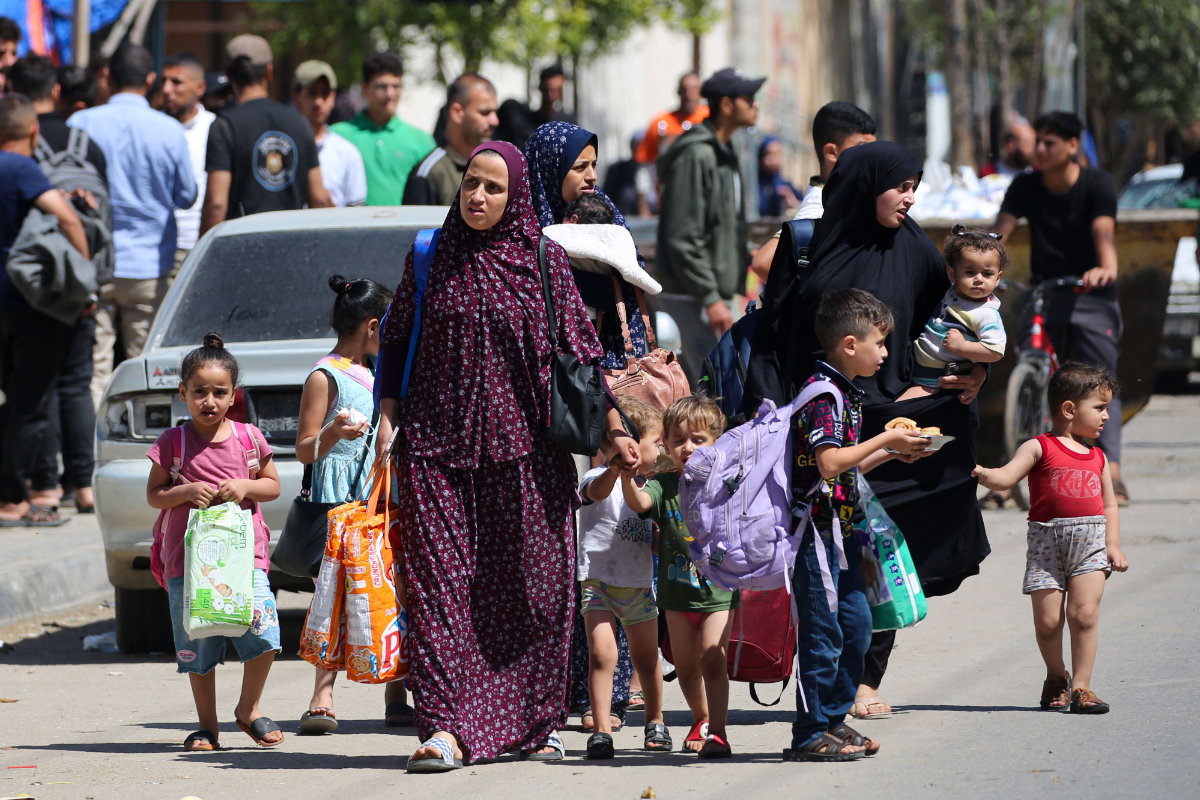
“During a recent heatwave, a 5-year-old girl tragically died in her tent due to extreme heat,” Shalltoot said.
Analysis of satellite imagery by BBC Verify found that the Israeli operation in Gaza has damaged or destroyed more than half (53 percent) of the territory’s vital water and sanitation facilities.
The analysis, based on images acquired in March and April, also confirmed that four of the six wastewater treatment plants in Gaza have been damaged or destroyed. These facilities were critical to preventing sewage buildup.
Fidaa Al-Araj, Oxfam’s food security, cash, and protection coordinator in Gaza, said the water, sanitation, and hygiene situation facing women and girls in the enclave was “challenging,” leaving them unable to access clean toilets or private shower spaces.
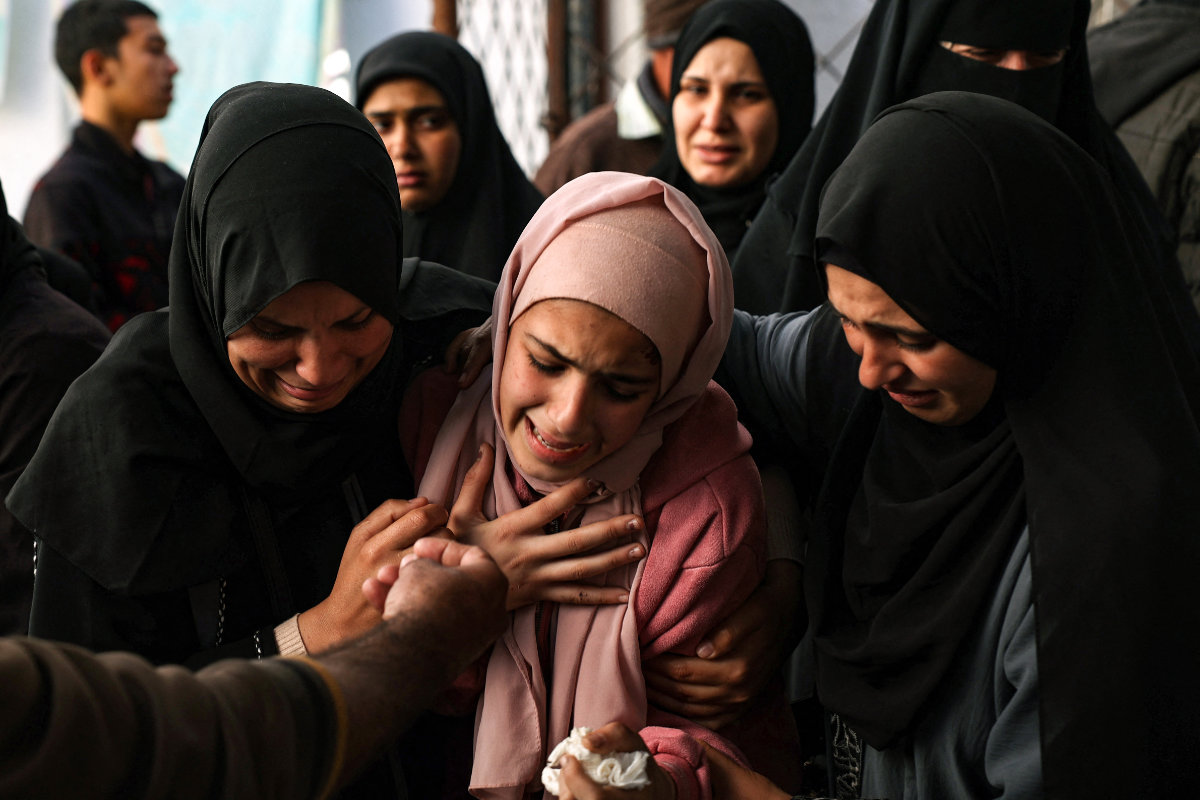
“Having been displaced into camps or even in a host community, the numbers of people, of internally displaced persons, are very, very high,” Al-Araj told Arab News. “So, there is (overcrowding), there are many difficulties in having access to toilets, bathrooms, showers.”
She added: “Even if you have the facilities, and even if by any stretch they are enough for the IDPs residing in any given space, there is the issue of lack of running water to supply those facilities and to have them up and running all the time.
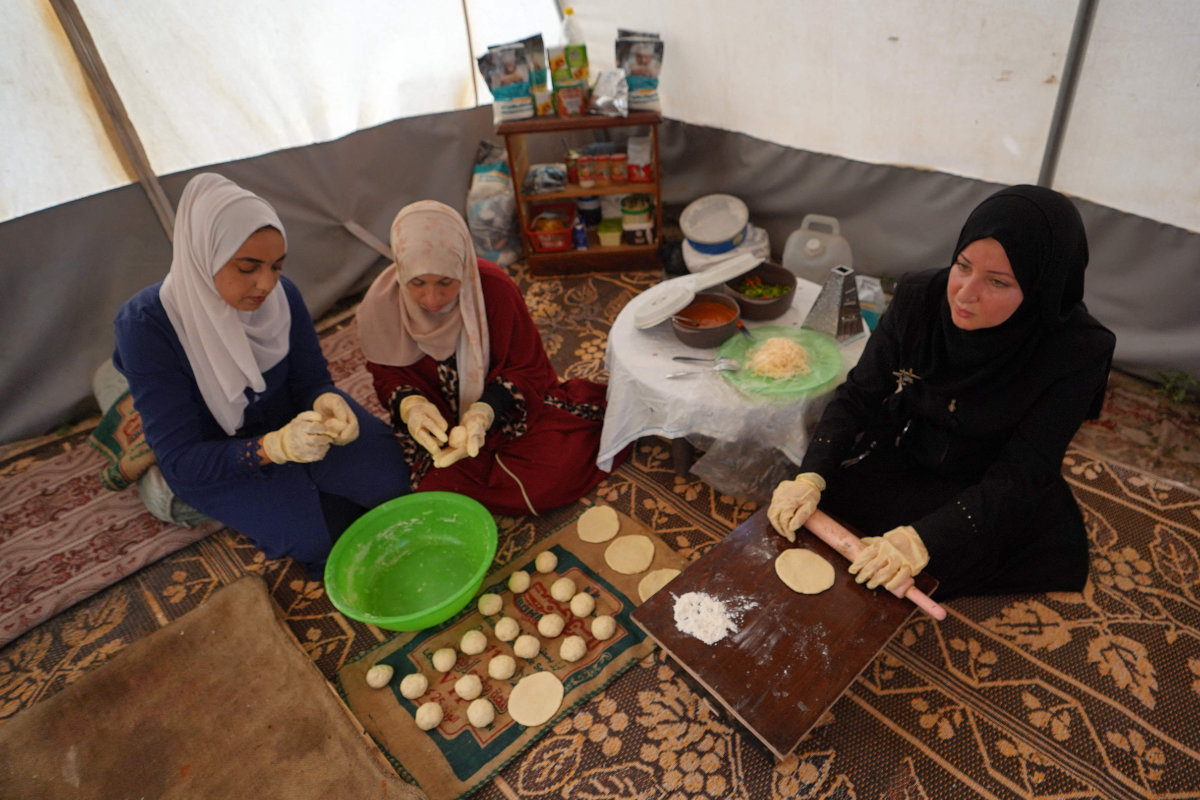
“So, the hygiene conditions are very compromised, to say the least. When it comes to women and girls, there are issues of privacy, which is completely lacking.”
Where washrooms are present, people have “to wait in line with all sorts of people, even strangers, men and women, just to use the toilet. You have people banging on the door of the toilet while you’re in there, asking you to hurry up because the line is still very long.”
INNUMBERS
• 700,000 Women and girls now hosted in Rafah who have nowhere else to go.
• 93% Women surveyed who feel unsafe in their own homes or in displacement.
• 6/10 Women who reported complications in pregnancy since Oct. 7.
Source: UN Women
This also makes management of menstruation especially challenging, as women and girls “endure longer hours without changing a pad, without washing,” Al-Araj added.
According to UN figures, there are more than 690,000 menstruating women and adolescent girls in the Gaza Strip. But aid agencies, which have had very limited access to the enclave due to the Israeli blockade, have been unable to meet the high demand for hygiene kits.
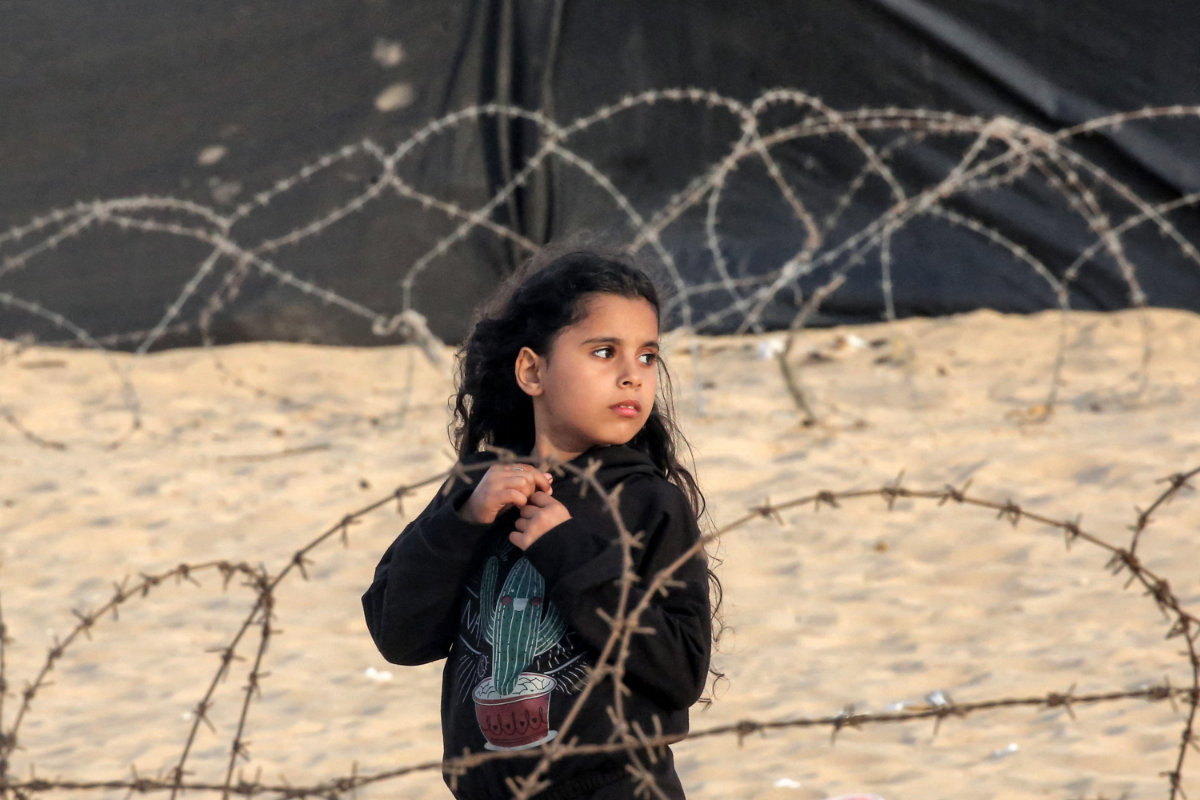
And since Israel took control of the Palestinian side of the Rafah border crossing on May 7 and closed the nearby Kerem Shalom crossing, the already limited flow of commercial goods and humanitarian aid has been further strangulated.
MAP’s Shalltoot confirmed that women’s sanitary products were “scarce in the local market,” highlighting that this has had “a psychological and physical health impact on women and girls.”
She said: “They resort to homemade, makeshift alternatives, which negatively impact their health by putting them at risk of reproductive and urinary tract infections and protection-related risks.
“This also negatively impacts their psychological well-being, anxiety and insecurity.”
Even the simple act of taking a shower has been almost impossible for women in Gaza for several months.
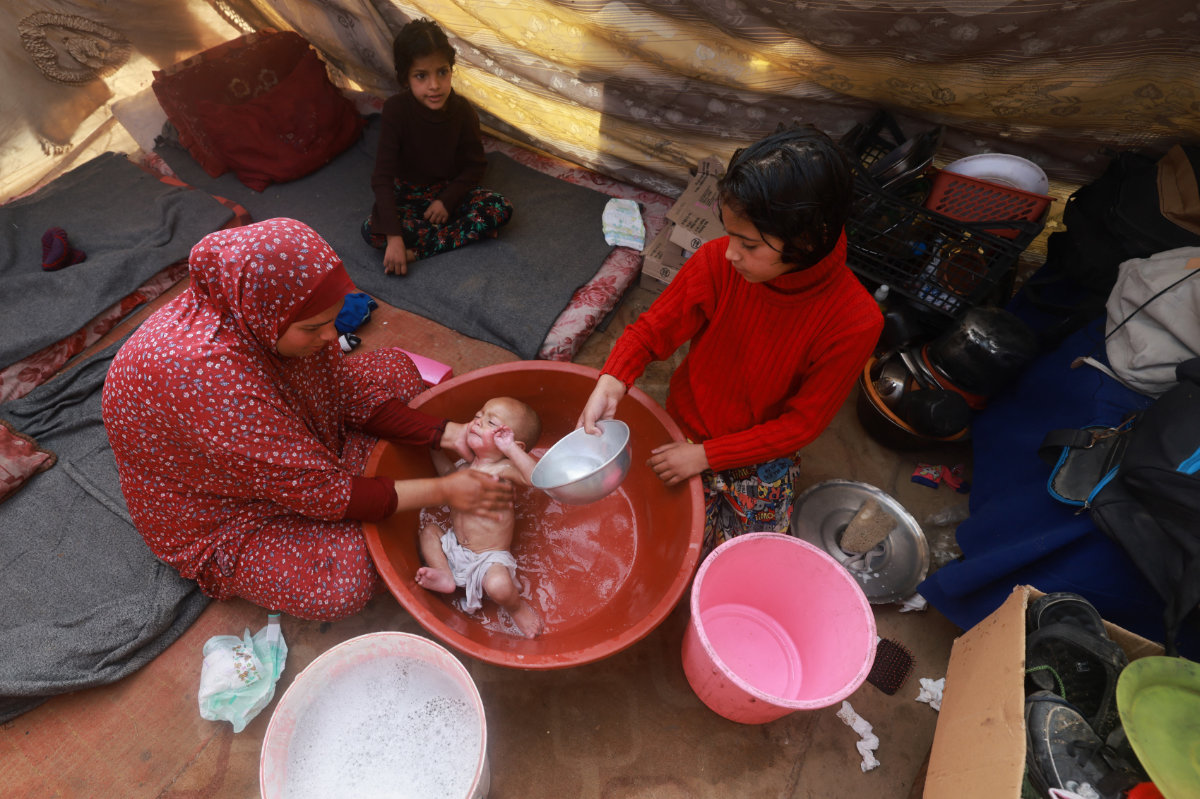
“It’s very difficult to find a spot designated to take showers, and if it’s there, it’s very difficult to have water,” Oxfam’s Al-Araj said. “And if the water is there, it’s very difficult to find time to take an adequate shower.”
She added: “As a woman and as a mother of girls, I’ve been through all of this. To overcome these circumstances, you space out the shower times, so you take a shower when it’s absolutely needed.
“Sometimes you could spend a couple of weeks or even more without taking a shower.”
The aid agency Medecins Sans Frontieres told the BBC that the destruction of water, sanitation and hygiene facilities has led to “disastrous health consequences for the population,” notably a significant rise in gastric complaints in Rafah.
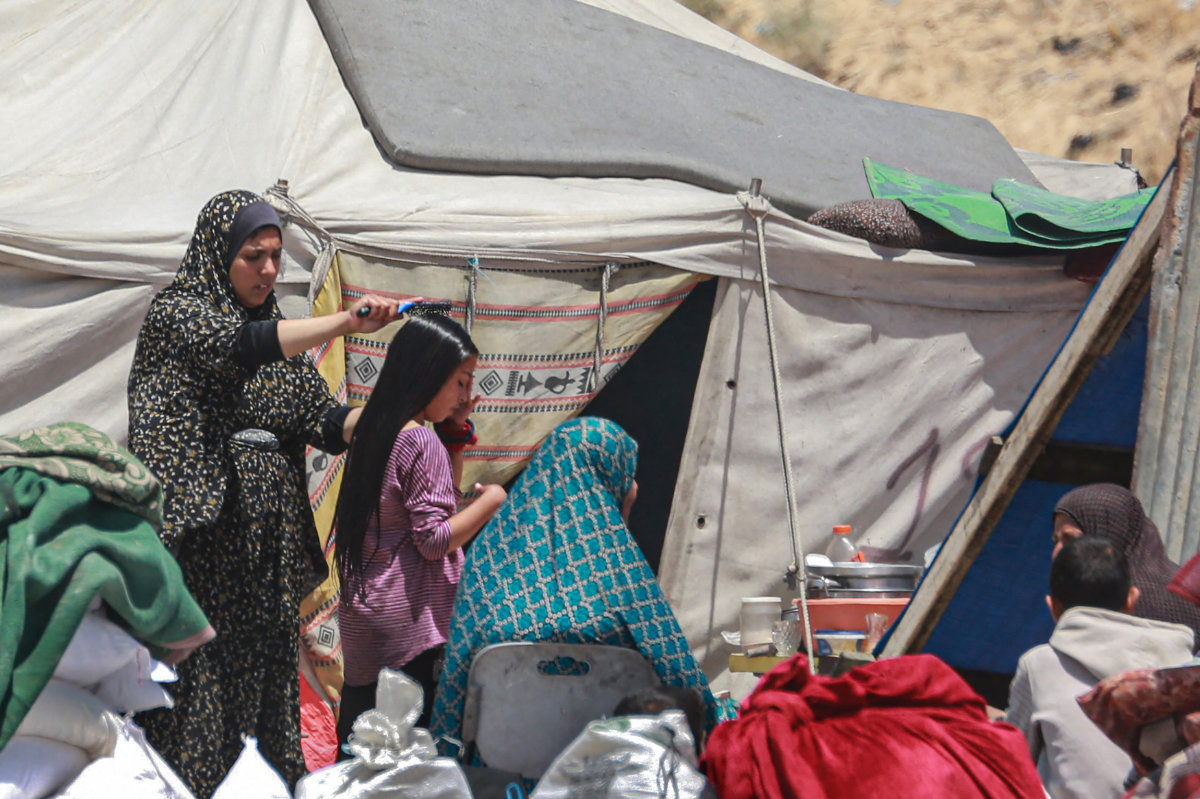
Contaminated water has also led to a spike in hepatitis A cases, with women and girls facing a heightened risk of exposure to the disease due to their traditional domestic responsibilities and caring for the sick, according to UN Women’s April gender alert report.
The report, titled “Scarcity and Fear,” highlighted that the lack of adequate and dignified facilities also exposes women and girls to reproductive and urinary tract infections.
“This situation could develop into dangerous or concerning health conditions for the women and girls, and I’m really sorry to say that it’s not given priority,” said Al-Araj.
“The heightening demand on the time, resources, and capacity of the medical facilities and staff makes prioritizing women’s issues or girls’ issues very difficult.”
Moreover, there are no quick fixes. Even if sufficient aid is permitted to enter Gaza, facilities need to be carefully planned in order to meet the necessary standards of privacy, cleanliness, and safety.
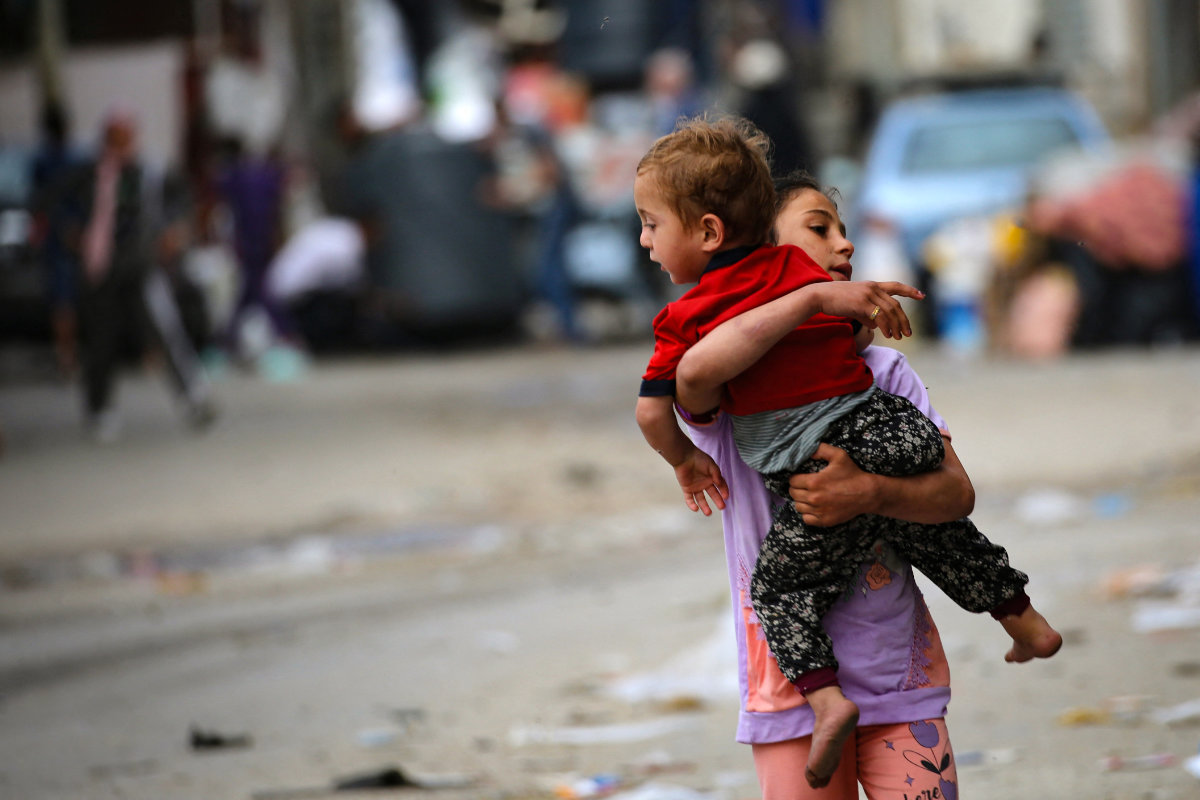
“It’s not enough to build a shower or a toilet,” said Al-Araj. “It’s not enough to provide it with water and that’s it. You have to think of the site … Is it safe for women and girls, is it accessible at all times … is it targeted maybe by different threats?
“You also have to think about the supplies. You don’t give a hygiene kit or a dignity kit once, for example, and that’s it, your work is done. You need to regularly provide those kinds of kits.”
Al-Araj also emphasized the need for “complementary services,” including extending responses “to enhancing access to sexual and reproductive health care system.
“I can only wish that the aftereffects of all of this wouldn’t linger for long or have irreversible results.”






















